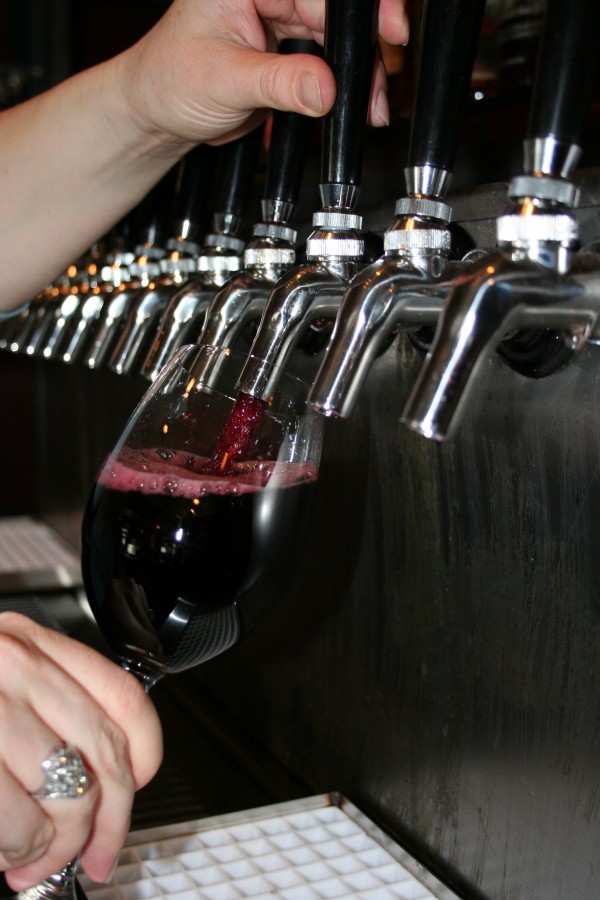In the late 1700s, locksmith—and hydraulic engineer—Joseph Bramah patented an invention called the beer engine, a device used for pumping beer out of a cask. Today we know this as the keg, but it wasn’t until the 1970s that the pressurized beer keg was perfected, and thanks to the keg stands of the 1978 movie Animal House, became mainstream. Flash forward to today’s keg and you will find that the iconic barrel stands for libations other than just beer.
Oregon wineries such as Grochau Cellars, Crowley Wines and Stoller Vineyards have been working towards perfecting the craft of keg wines, mostly at the direct request of restaurants. More and more tap handles in dining establishments are dispensing not only frothy cold beer but red, white and pink wine.
Kegs for wine are well suited for restaurants for the same reason they work so well with beer—preserved freshness and minimized waste. Irving Street Kitchen and The Bent Brick are two Portland eateries committed to the idea of wine-on-tap. Each restaurant has at least as many wines on tap as fingers on your hands and an entire system dedicated to the perfect pour. The Bent Brick, which started working with wine on tap when they opened in June of 2011, currently has 16 wine taps. “We like it for many reasons. First of all, there is no wine spoilage due to a bad cork or oxidation. There is no waste or excess packaging from bottles, since the kegs are refillable,” explains Bent Bricks general manager, Anna Josephson, who adds, “Also, we have developed beautiful relationships with the local wineries, because we get most of our wines directly from them.”
For John Grochau, owner and winemaker of Portland urban winery Grochau Cellars, it was restaurants that inspired him to start “kegging” in 2009. “I have played with alternative packaging a few times (like bag in box), but it wasn’t until Irving Street Kitchen came to me asking if I would package wine in kegs for table service in their restaurants that I started looking seriously at the concept,” says Grouchau, who now sells some of his wine via keg to two Portland locations: St. Jack and The Bent Brick.
Tyson Crowley, owner and winemaker for Crowley Wines, has his wine on tap at Oven and Shaker as well as St. Jack. For him, it’s about wine for wine’s sake. “I am drawn to the simplicity of wine served in a carafe sitting on a dining table being enjoyed without being swooned over. It evokes an old world sensibility where I imagine wine as a background element in a dining experience, not a central focus. Somehow the stripped down aspect of that has always seemed very pure and lovely,” reflects Crowley.
The cost is the crutch, and that cost is the tap system. You can’t just throw a wine keg on a beer line and expect it to work. Several things negate the success of this method; the most off-putting of theses effects is the interaction with the metal connectors on standard beer lines which creates a not so desirable chemical reaction in the wine when it comes out the tap. A restaurant must be committed to the program and willing to make the initial investment in wine-compatible lines. Once the system is in, though, it makes for not only a higher quality and more sustainable product but the effect for the customer is—simply put—very cool.
The future of keg wine is ambiguous because of the novelty and uncertainty associated with the willingness of both wineries, to produce in the new style, and restaurants, to cover the costs of line installation. Legislation issues for distribution are also a consideration. Still, legislators seem receptive a select group of winemakers will work on perfecting the process. We are convinced Oregon can expect to see a lot more wines on tap in both restaurants and retail stores (and maybe even farmers markets). For now let us raise a glass of keg vino to John Belushi and the rest of the men of Delta Tau Chi Fraternity who helped make this moment possible….oh how far we have come.









It would be even cooler if carafe prices from keg were similar to the prices paid in Europe.